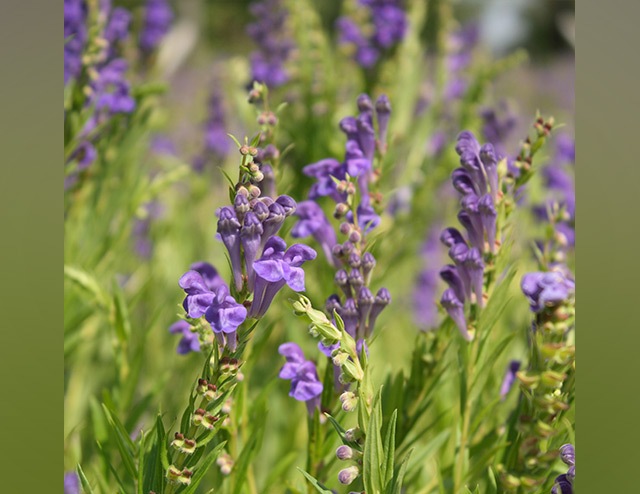Learn about brain health and nootropics to boost brain function
Chinese skullcap herb found to kill ovarian cancer cells



(Natural News) Scutellaria baicalensis, also known as Chinese skullcap, is a flowering plant used in traditional Chinese medicine. Its roots have been used since ancient times to treat various conditions, such as inflammation, hypertension, psoriasis, and respiratory infections. S. baicalensis contains many active components, the most widely studied of which are the flavonoids baicalin and baicalein. Baicalin has been shown to have neuroprotective, cognitive-enhancing, and anti-cancer activities. In a recent study published in The American Journal of Chinese Medicine, researchers from the University of Macau investigated the bioactivity of the other flavonoid, baicalein (BA). They reported that BA also exhibits anti-cancer activity against ovarian cancer cells in vitro.
The health benefits of Chinese skullcap
S. baicalensis belongs to the mint family and is widely known as a rich source of antioxidants. In particular, the flavones found in S. baicalensis can significantly reduce the effects of oxidative stress on many tissues in the body. Its major active components, baicalin and BA, are also known to display a wide range of therapeutic activities.
In traditional medicine, S. baicalensis is used to treat ailments related to the heart, liver, and brain. The herb is especially effective against conditions caused by inflammation. The compounds found in the roots of S. baicalensis also make them potent against viruses, bacteria, and certain cancers. (Related: Baicalin from Chinese skullcap inhibits growth of squamous cell skin carcinoma.)
| Discover how to prevent and reverse heart disease (and other cardio related events) with this free ebook: Written by popular Natural News writer Vicki Batt, this book includes everything you need to know about preventing heart disease, reversing hypertension, and nurturing your cardiac health without medication. Learn More. |
Due to its many health benefits, S. baicalensis has become a popular natural supplement. It is now sold in the form of capsules, powders, or liquid extracts. Dried S. baicalensis, particularly its leaves, can also be procured and used to make tea. Supplementation with S. baicalensis is associated with the following benefits:
- Mood improvement
- Reduced anxiety
- Stronger immune system
- Anticonvulsant effect
- Improved sleep
- Enhanced cognitive function
- Protection from heart disease
Before using Chinese skullcap supplements, consult with a health care provider. The active compounds in these supplements may interact with some medications. Also, some supplements contain other herbs besides S. baicalensis. These combinations may be formulated for specific conditions, so pregnant women or children should not use them without the advice of a health care practitioner.
Baicalein from S. baicalensis can induce apoptosis in ovarian cancer cells
In their study, the researchers investigated the bioactivity of BA against ovarian cancer cells. According to several studies, BA exhibits antioxidant, anti-inflammatory, and anti-cancer activities.
The researchers found that BA can reduce the cell viability of ovarian cancer cells and induce apoptosis. They also found that treatment with BA enhanced microtubule-associated protein light chain 3-II (LC3-II) expression, acidic vesicular organelle, and GFP-LC3 fluorescence dot accumulation. LC3-II is a membrane-bound protein involved in autophagy. Its primary function is to initiate the formation and elongation of autophagosomes — vesicles that carry cellular components bound for degradation.
BA treatment with chloroquine, a medication used for malaria, further reduced cell viability and increased the cleavage of poly (ADPribose) polymerase (PARP) in both HEY and A2780 ovarian cancer cell lines, indicating that BA induces protective autophagy in these cells. PARP is a protein found in cells. It helps damaged cells repair themselves.
Knockdown of Beclin 1 by siRNA also remarkably decreased BA-induced LC3-II lipidation. Beclin 1 plays an important role in autophagy; the decrease in BA’s activity in the absence of Beclin 1 suggests that the mechanism of action of BA is Beclin 1-related.
BA treatment also increased the phosphorylation of extracellular signal-regulated kinases (ERK, Thr202/Thr204) and AKT (Ser473), which are all involved in cellular processes related to survival. Furthermore, BA inhibited ERK activation by the pharmacological inhibitor U0126. On the other hand, ERK siRNA blocked BA-induced autophagy.
Based on these results, the researchers concluded that BA can induce Beclin 1- and ERK-dependent autophagy in ovarian cancer cells, proving its potential as natural anti-cancer medicine.
Sources include:
Click here to view full article